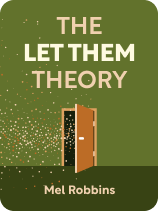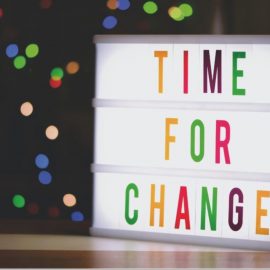

This article is an excerpt from the Shortform book guide to "The Let Them Theory" by Mel Robbins. Shortform has the world's best summaries and analyses of books you should be reading.
Like this article? Sign up for a free trial here.
Do you have trouble accepting reality? How can you stop influencing what other people say or do?
Underlying the Let Them Theory is the idea that you have to accept reality as it is, without judging it, without resisting it, and without wanting to change it into something that it’s not. Mel Robbins points out that your time and energy are precious resources that you need to invest wisely.
Keep reading to learn how to invest yourself wisely by accepting the way things are.
Why Do “Let Them” and “Let Me” Work?
When we allow external factors to drain us emotionally and mentally, we deplete the reserves we need to work toward our goals, deepen our relationships, and improve our well-being. Stress and negative emotions are a natural consequence of letting other people deplete our time and energy, and these can have detrimental effects on our physical and mental health, with results like burnout, anxiety, and depression. Robbins contends that if you protect your energy and accept reality with the Let Them Theory, you can carve out the space for a more positive, productive, and fulfilling life.
She also explains that when you stop trying to influence what other people say and do, you not only regain precious time and energy, but you learn to protect your emotional well-being, too. When you let go of the need to control others, you free yourself from the frustration and emotional upheaval that comes with trying to manage situations beyond your influence. This newfound peace of mind allows you to approach life with greater clarity and intention—and to better see situations and relationships for what they really are.
(Shortform note: The impulse to control other people—and deplete our psychological reserves while doing so—can manifest in a surprising way: people-pleasing. According to Hailey Magee (Stop People Pleasing), people-pleasers don’t seem controlling on the surface: They appear accommodating and selfless. But their behavior stems from trying to control how others perceive them. They expend tremendous energy trying to manage others’ perceptions, emotions, and reactions, while neglecting what they actually can control: their own boundaries and actions. Many of us drain our mental reserves by trying to make others like us, respect us, or treat us well, when we’d be better served by defining and honoring our own boundaries.)
Robbins characterizes the Let Them Theory as a way to apply ideas promoted by Stoicism, Buddhism, detachment theory, and radical acceptance:
- Stoicism teaches us to focus on what we think and do, rather than fixating on the thoughts and actions of others.
- Buddhism and radical acceptance explain that we make ourselves miserable by wishing that reality were different and trying to change it.
- Detachment theory teaches that to avoid being miserable and anxious about things that are outside our control, we have to step back and emotionally distance ourselves.
(Shortform note: The classic novel The Catcher in the Rye by J.D. Salinger illustrates the struggle to accept reality as it is. Holden Caulfield is disillusioned by the selfishness he sees in the adult world, where many people are “phony” and self-interested. Modern readers can still relate to Holden’s journey from adolescence to adulthood and the disillusionment that comes with realizing the flaws of the world. Holden struggles to accept the world as it is, rather than clinging to his idealized fantasies or attempting to escape reality. But he does find moments of beauty and authenticity in other people, and these provide respite from the ugliness of the world and help him come to terms with the world as it is, rather than as how he wishes it could be.)
| The Ancient Wisdom of Accepting Reality The Let Them Theory draws on a range of philosophical and psychological traditions that have each recognized the value of accepting reality as it is. Despite their different origins, each converges on the same insight: The path to emotional freedom requires distinguishing between what we can and can’t change, and checking our impulse to resist what lies beyond our control. Stoicism, a school of philosophy founded in Athens around 300 BCE, teaches that emotional suffering comes from our judgments about events, not the events themselves, as Ryan Holiday explains in The Obstacle Is the Way. The Stoic philosopher Epictetus wrote, “Make the best use of what is in your power, and take the rest as it happens.” Stoics differentiate events according to what they called the dichotomy of control: things within our control (primarily our own thoughts and actions) and things outside our control (including others’ behaviors and external circumstances). The Stoic ideal is to focus exclusively on what we can control while practicing indifference toward what we cannot. Buddhism, a 2,500-year-old Eastern philosophical tradition, identifies attachment and craving as the root causes of suffering (dukkha). The Buddha’s Four Noble Truths establish that suffering arises from resisting the impermanent nature of reality and desiring things to be different than they are. Buddhist mindfulness practices encourage nonjudgmental awareness of the present moment, developing what’s called upekkhā (equanimity)—the ability to observe reality without being carried away by reactions to it. Detachment theory in psychology describes the process of emotionally distancing yourself from situations to gain a healthier perspective and reduce your emotional reactivity. Unlike disassociation, healthy detachment involves maintaining awareness while creating space between oneself and triggering circumstances. Detachment is the ability to care deeply about other people, but not be controlled by others’ moods or behavior. Radical acceptance, a concept popularized by psychologist Marsha Linehan in Dialectical Behavior Therapy, involves fully accepting reality without resistance, even when it’s painful. As Tara Brach explains in Radical Acceptance, this doesn’t mean you approve of what’s happening or that you don’t want things to change; instead it means that you understand and acknowledge what’s happening, without letting yourself be ruled by it. By stopping yourself from struggling against unchangeable circumstances, you free up the energy to respond intentionally and effectively, rather than react emotionally. |

———End of Preview———
Like what you just read? Read the rest of the world's best book summary and analysis of Mel Robbins's "The Let Them Theory" at Shortform.
Here's what you'll find in our full The Let Them Theory summary:
- A simple but powerful framework for reclaiming your time and mental energy
- How to detach from situations and behaviors that are outside your influence
- How the "let them" theory can be taken too far, and how to avoid it from happening






